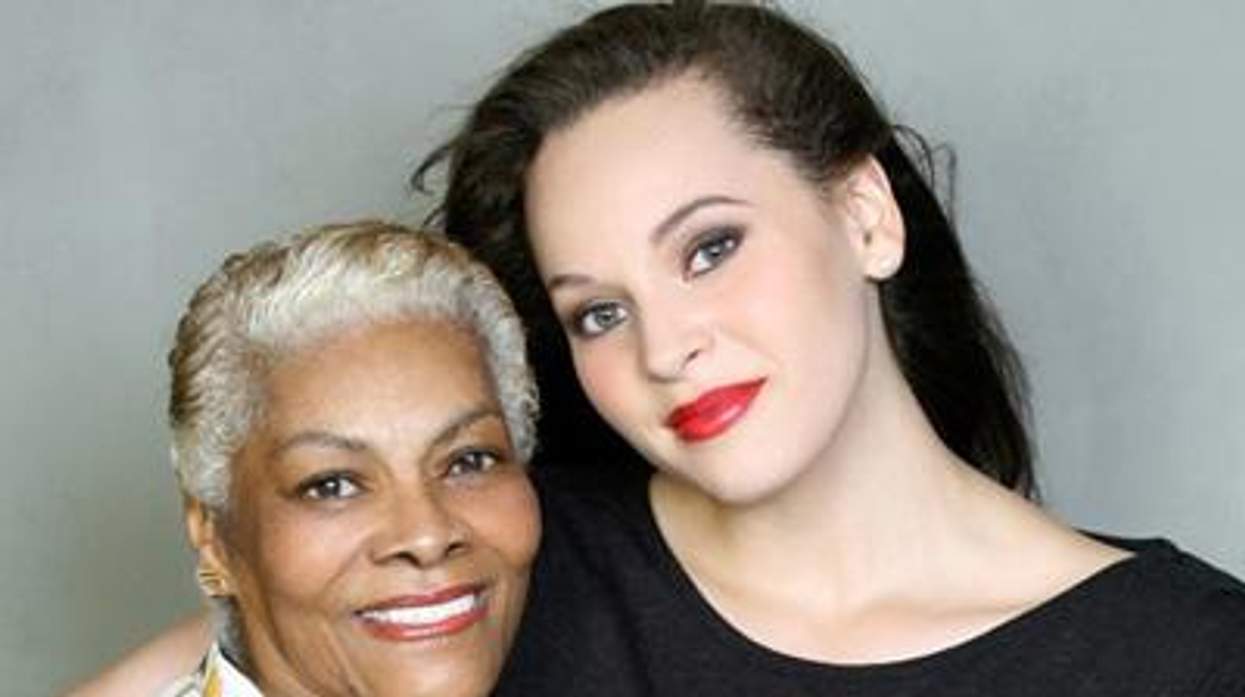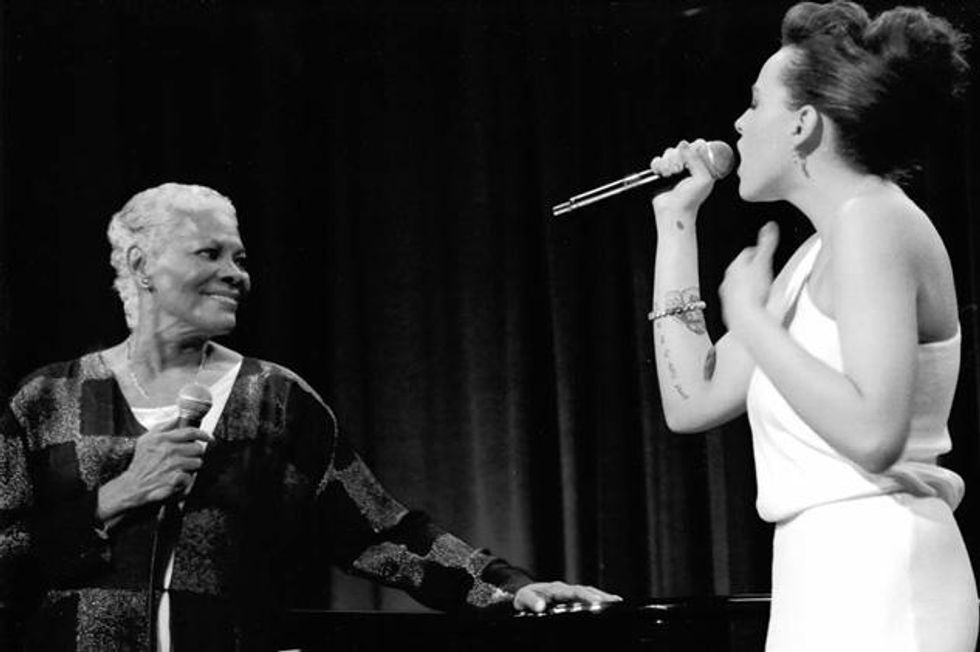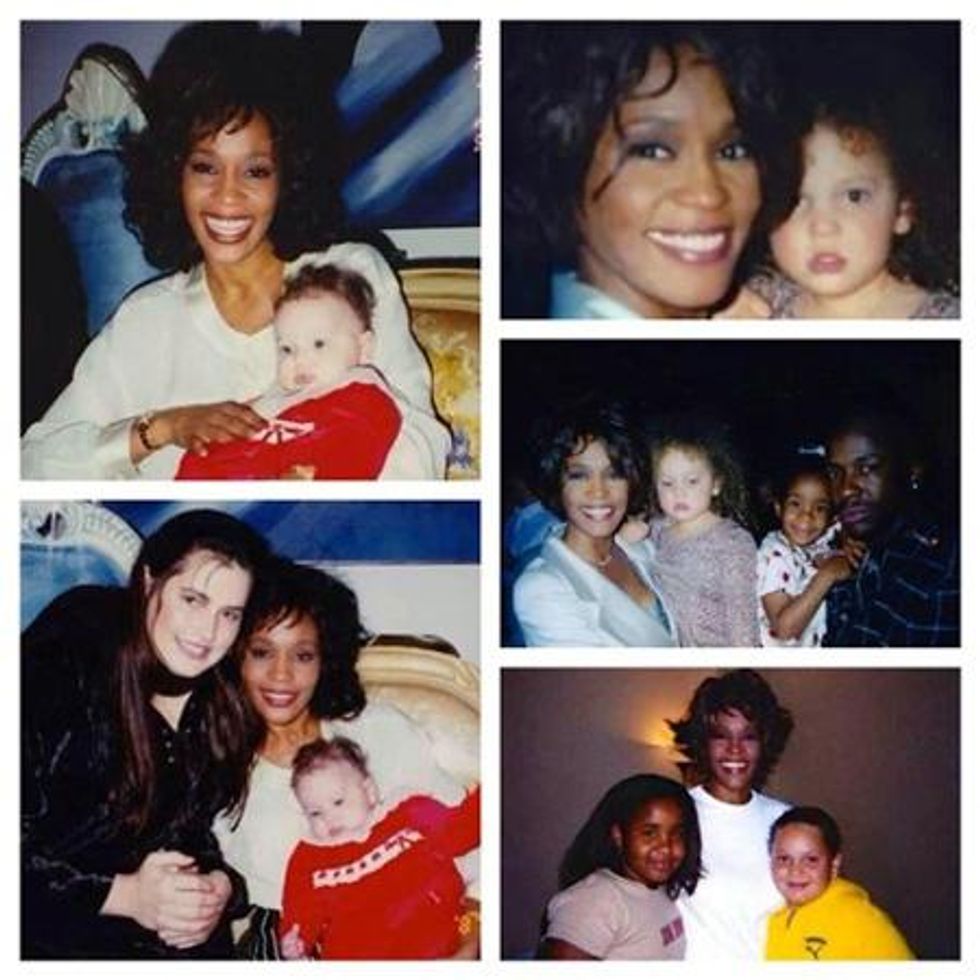Dionne Warwick has had one of the most respected careers in music history. Throughout the 1960s, she made pop magic singing the sophisticated tunes of the legendary songwriting team Burt Bacharach and Hal David, scoring a dazzling string of hits with songs such as "I Say a Little Prayer," "Walk on By" and "Do You Know the Way to San Jose." In the late 1970s, another round of hits began with "I'll Never Love This Way Again," produced by Barry Manilow.
Warwick is also one of the most famous allies LGBT people have ever known. During the 1980s, at a time when only a handful of celebrities were visible in the fight against AIDS, Warwick was front and center, repeatedly lending her talents to high-profile charity events. In 1985 she rounded up several other pop icons, including Elton John, Gladys Knight, and Stevie Wonder, to record "That's What Friends Are For" to raise money for amfAR, an AIDS research organization. The song wound up in Billboard's number 1 spot, where it sat for weeks, raising more than $3 million.
Of course, Warwick also famously mentored her younger cousin, the late superstar Whitney Houston.
Now, at 74 years old, Warwick takes pride in the newest singer in the family, her 20-year-old granddaughter Cheyenne Elliott, who is already making a name for herself with "With You," an exhilarating single that's been steadily climbing up Billboard's dance music chart. The young singer is also as committed to supporting LGBT causes as as her famous family members have been.
Together, the two chat with The Advocate about the family business, their late cousin Whitney, LGBT rights, and more.
The Advocate: Cheyenne, congratulations on the success of "With You." Is it surreal seeing your own name on a Billboard chart?
Elliott: It's crazy. It's such an honor. I am in a legacy-filled family, but for me to be recognized and for the response to be so positive, it shocks me. Every day I wake up and I am like, Wow, my song is on the Billboard dance chart!
Was going into music always in the cards for you?
Elliott: I always wanted to be in the music industry from as far back as I can remember. When I was a kid, my grandmother took me on tour with her. I was on the road at 12 years old. That's how I would spend all my summer vacations off from school -- I'd go tour the entire world with her. It's really been in my blood and my life forever.
You're going into this business pretty clear-eyed. You've seen how much work goes into a career like your grandmother's and like Whitney's.
Elliott: I have. I know what to expect. It's work. A lot of people fail to realize that. I'm really lucky. Before I was even a teenager I knew what it was like to stay up for 24 hours and take planes and trains to get where we needed to go and perform and be "on."
Certainly there are perks to having Dionne Warwick as a grandmother and Whitney Houston as a cousin. But it must also be intimidating for a young singer.
Elliott: They're some the biggest names in the industry! I am honored to be a part of the family, but yeah, I definitely have to bring it. I have to make sure what I put out into the world reflects positively on my family -- and myself. But there's a lot of support. I have a lot of support coming from every direction in my family.
Dionne, what are the secrets to mentoring a young singer? Can you share your patented tips?
Warwick: Like I told Whitney and I've told Cheyenne on several occasions, it's more than opening up your mouth and having some notes fall out of it. There's a lot more to the business than just that. I think she has a complete grasp on that by this point. But you know, I don't really give advice. I'll answer a question if you ask. However, the only thing I have said, and I continued to pound this into Whitney's head as I'll continue to pound it into Cheyenne's head, is be who you are. You can't be someone else, nor should you want to. That's really it.
Cheyenne, I know your grandmother is fussy about a singer's enunciation.
Elliott: She is! But she's right. There's a lot of singers you listen to and you have no idea what they're saying, you don't even know the whole message of the song. It cheapens the performance. So she's very aggressive about telling me about enunciation and diction. I've heard that for years.
Dionne, do you think that's because early on you were recording those songs with such wonderful lyrics by Hal David?
Warwick: That's the way it should be with anything that's being recorded. You should be able to understand what's being said. In most cases, I think they purposely mispronounce words or put a slur on them so you don't understand the words.
 Cheyenne, your vocal delivery reminds me of your grandmother's and Whitney's too. It's very clean. There are no busy notes or acrobatics.
Cheyenne, your vocal delivery reminds me of your grandmother's and Whitney's too. It's very clean. There are no busy notes or acrobatics.
Elliott: My grandmother's always telling me that -- just sing the song. And my dad [songwriter David Elliott] as well. He really tells me that all the time. Just sing the song. You don't need to add all these extra things. It cheapens it.
Warwick: There are basically eight notes in a scale. You don't have to sing all of them at one time. [Laughs] Give respect to the person who wrote the particular notes by singing those notes the way the person wanted them sung. Every now and then you find that you want to add something. However, to decide to do acrobatics to demonstrate your vocal cords just doesn't make sense to me.
In every era of pop, we have plenty of performers who shimmy and dance and wear sexy outfits -- and then someone comes along, like Whitney in the 1980s, who just knocks a song out of the park. No choreography. No flash. Just talent. Fans are always so grateful for those people.
Warwick: That's what's exciting about Chey. She has a voice and she's found her niche. She doesn't have to be like anyone else.
So, Cheyenne, we shouldn't expect any twerking from you?
Elliott: [Laughs] No! You definitely won't.
What was your relationship like with Whitney? She was a lot older than you.
Elliott: She was more like an aunt to me. Which was really great. She was so busy and she was all over the world. But I'd see her at family events. And we recorded a song together once for a Tyler Perry movie, which was amazing.
Personally, I could not have handled being a child and having Whitney Houston as my cousin. Every day I would have figured out some way to bring it up at school, like, "Oh, are you eating lunch? My cousin Whitney Houston eats lunch." Did you brag?
Elliott: [Laughs] No. That's just not who I am. I never really talked about it much. Like I said, I went on tour every summer with my grandmother. So we'd get back to school and people would say, "How was your summer?" and I would be like, "It was great. I got to go to Europe." I actually had a lot of friends who never knew anything about my family for years. When they found out, they were like, "What? You never told me that!" But I'm lucky. Both of them are amazing. It's great to hear the feedback. I mean people love me because they love my family.
You've seen the flip side of fame too. When you're in a famous family, people feel like they're connected to the family too. They'll feel joy for you when things are good, and when tragedy strikes, I think they feel entitled to intimate details. How have you dealt with that?
Elliott: You have to tell people that life has its ups and downs and everybody has struggles. Everybody has hardships. You just have to deal with it. Try the best that you can.
Dionne, does it bother you when people pry?
Warwick: No, it doesn't bother me, because I know how to say, "That's personal. It's none of your business. I'm not going to talk to you."
Let's talk a bit about what your family has done for the LGBT community. Dionne, in the 1980s you were at the forefront of folks using their celebrity to help those with AIDS. That was not a popular stance at the time. Even our own president, Ronald Reagan, refused to publicly say the term AIDS --
Warwick: I'm the person who got him to say AIDS.
Tell us the story.
Warwick: It was at the Press Club. I was doing a press conference after he appointed me United States Ambassador of Health. We were discussing AIDS and I said, "President Reagan, what's this thing we're discussing? What's it's called?" I was the first person to actually get him to say the words AIDS.
What compelled you to give so much support to AIDS causes years before most did?
Warwick: Well, basically because we were losing so many people in my particular industry and not knowing why. We were losing hair people and makeup people, designers, and not knowing why. I was wondering, What is this thing? We have to pay some attention to it. I happened to, unfortunately, have lost my valet to AIDS. We didn't know what it was at the time. I thought it was cancer, like everybody else did. Until we got a face and a name to put this thing on the map and got us all talking about it and looking at what it was really was, and his name was Rock Hudson.
Was there blowback for you for getting involved?
Warwick: Well, yeah. Everybody thought I was crazy! [Laughs] But, you know, I can understand -- not knowing how it was contracted. But I was curious enough to meet with the [Centers for Disease Control and Prevention] and with [medical researcher] Anthony Fauci and other doctors around the world. We all found out how it was transmitted, blood to blood, semen to semen. So shaking somebody's hand or giving them a hug, you were not going to get AIDS. We had to get that information to people.
 Did you guide Whitney into her support for the LGBT community, or was that something she was interested in on her own?
Did you guide Whitney into her support for the LGBT community, or was that something she was interested in on her own?
Warwick: You know, you don't guide people into helping people. It has to be something they want to do. That was her to decision to make, and she did.
Cheyenne, I know you recently performed at Night of a Thousand Gowns, which benefits LGBT groups. You'll be performing this summer at New York City Pride. What brings you to your involvement in LGBT rights?
Elliott: I think it's important. I want to make sure people get equal rights. Everybody should get to do what they want to do and be who they want to be. I have family members that are gay and lesbian and I completely support them. It's important for me to see they get to have what I have. I'm very happy to support the LGBT community.
Dionne, were you happy to see that your old friend Barry Manilow recently married his longtime partner?
Warwick: Absolutely. I am thrilled that he and Garry felt they wanted to be joined at the hip, which is a wonderful thing.
Back to the music, you two have recorded a few duets together, most recently on Dionne's 2014 album Feels So Good. Was that a blast?
Warwick: It's a lot of fun. I love standing back and watching her and listening to her.
Cheyenne, now that you're a star, who else would you like to sing with?
Elliott: Sam Smith. I would love to work with him some day.
You two could be the Dionne and Elton of your day!
Elliott: Right! I would love that. That would be amazing!
Follow Cheyenne Elliott on Twitter.


 Cheyenne, your vocal delivery reminds me of your grandmother's and Whitney's too. It's very clean. There are no busy notes or acrobatics.
Cheyenne, your vocal delivery reminds me of your grandmother's and Whitney's too. It's very clean. There are no busy notes or acrobatics. Did you guide Whitney into her support for the LGBT community, or was that something she was interested in on her own?
Did you guide Whitney into her support for the LGBT community, or was that something she was interested in on her own?

































































Charlie Kirk DID say stoning gay people was the 'perfect law' — and these other heinous quotes